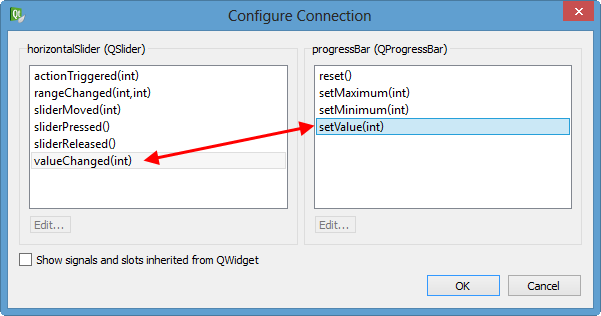Qt signal/slot implementation is thread safe, so that you can use it to send messages between different QThreads, this is especially important, as anything UI related should run in the main thread of Qt, anything that could block your UI should not run in this thread, so running jobs in a QThreadPool and emitting the finished result as a signal is a common pattern. Signals and slots are loosely coupled: A class which emits a signal neither knows nor cares which slots receive the signal. Qt's signals and slots mechanism ensures that if you connect a signal to a slot, the slot will be called with the signal's parameters at the right time. Signals and slots can take any number of arguments of any type.

Signals and slots is a language construct introduced also in Qt[1] for communication between objects which makes it easy to implement the observer pattern while avoiding boilerplate code. The concept is that GUI widgets can send signals containing event information which can be received by other widgets / controls using special functions known as slots. This is similar to C/C++ function pointers, but signal/slot system ensures the type-correctness of callback arguments.[citation needed]
Slot guide. The signal/slot system fits well with the way graphical user interfaces are designed.[citation needed] Similarly, the signal/slot system can be used for other non-GUI usages, for example asynchronous I/O (including sockets, pipes, serial devices, etc.) event notification or to associate timeout events with appropriate object instances and methods or functions. It is easy to use and no registration/deregistration/invocation code need to be written, because Qt's metaobject compiler (MOC) automatically generates the needed infrastructure.
Qthread Slot Signal
A commonly used metaphor[according to whom?] is a spreadsheet. A spreadsheet has cells that observe the source cell(s). When the source cell is changed, the dependent cells are updated from the event.
Alternative implementations[edit]
There are some implementations of signal/slot systems based on C++ templates, which don't require the extra metaobject compiler, as used by Qt, such as libsigc++, sigslot, vdk-signals, nano-signal-slot, neosigslot, Signals, boost.signals2, Synapse, Cpp::Events, Platinum and JBroadcaster. Common Language Infrastructure (CLI) languages such as C# also supports a similar construct although with a different terminology and syntax: events play the role of signals, and delegates are the slots. Another implementation of signals exists for ActionScript 3.0, inspired by C# events and signals/slots in Qt. Additionally, a delegate can be a local variable, much like a function pointer, while a slot in Qt must be a class member declared as such. The C based GObject system also provides similar functionality via GSignal.In D it is implemented by std.signals.
See also[edit]
Libraries[edit]
Java: sig4j - multi-threaded, type-safe, based on the FunctionalInterface annotation introduced in Java 8.

Download cleopatra slot machine free. Ameristar casino in kansas city. C++: vdk-signals - thread-safe, type-safe, written in C++11 with atomic variables.
References[edit]
Qt Signal Slot Different Thread
- ^'Signals & Slots - QtCore 5.1'. Qt Project. 2013-07-04. Retrieved 2013-07-04.

Signals and slots is a language construct introduced also in Qt[1] for communication between objects which makes it easy to implement the observer pattern while avoiding boilerplate code. The concept is that GUI widgets can send signals containing event information which can be received by other widgets / controls using special functions known as slots. This is similar to C/C++ function pointers, but signal/slot system ensures the type-correctness of callback arguments.[citation needed]
Slot guide. The signal/slot system fits well with the way graphical user interfaces are designed.[citation needed] Similarly, the signal/slot system can be used for other non-GUI usages, for example asynchronous I/O (including sockets, pipes, serial devices, etc.) event notification or to associate timeout events with appropriate object instances and methods or functions. It is easy to use and no registration/deregistration/invocation code need to be written, because Qt's metaobject compiler (MOC) automatically generates the needed infrastructure.
Qthread Slot Signal
A commonly used metaphor[according to whom?] is a spreadsheet. A spreadsheet has cells that observe the source cell(s). When the source cell is changed, the dependent cells are updated from the event.
Alternative implementations[edit]
There are some implementations of signal/slot systems based on C++ templates, which don't require the extra metaobject compiler, as used by Qt, such as libsigc++, sigslot, vdk-signals, nano-signal-slot, neosigslot, Signals, boost.signals2, Synapse, Cpp::Events, Platinum and JBroadcaster. Common Language Infrastructure (CLI) languages such as C# also supports a similar construct although with a different terminology and syntax: events play the role of signals, and delegates are the slots. Another implementation of signals exists for ActionScript 3.0, inspired by C# events and signals/slots in Qt. Additionally, a delegate can be a local variable, much like a function pointer, while a slot in Qt must be a class member declared as such. The C based GObject system also provides similar functionality via GSignal.In D it is implemented by std.signals.
See also[edit]
Libraries[edit]
Java: sig4j - multi-threaded, type-safe, based on the FunctionalInterface annotation introduced in Java 8.
Download cleopatra slot machine free. Ameristar casino in kansas city. C++: vdk-signals - thread-safe, type-safe, written in C++11 with atomic variables.
References[edit]
Qt Signal Slot Different Thread
- ^'Signals & Slots - QtCore 5.1'. Qt Project. 2013-07-04. Retrieved 2013-07-04.